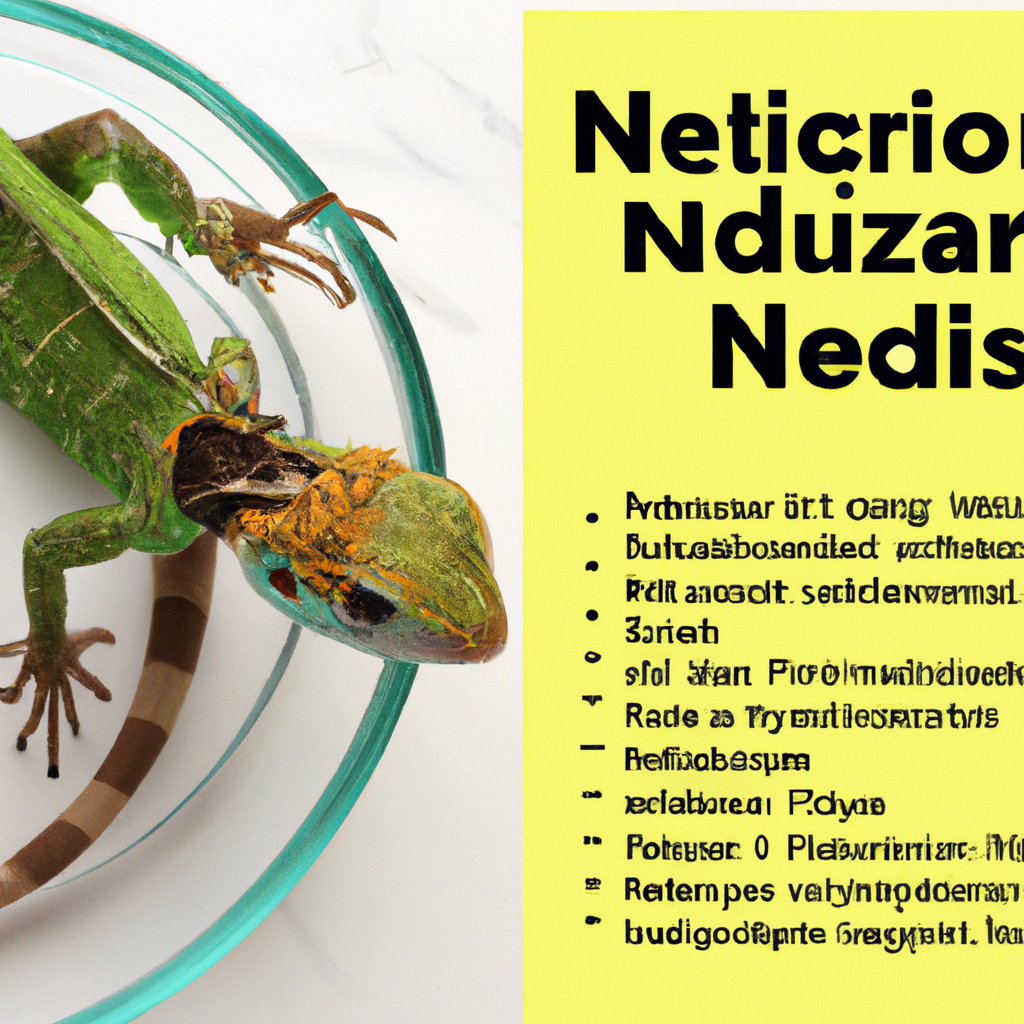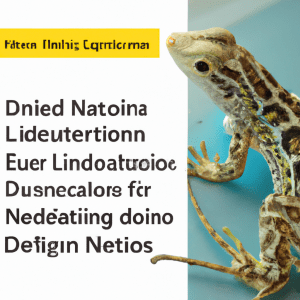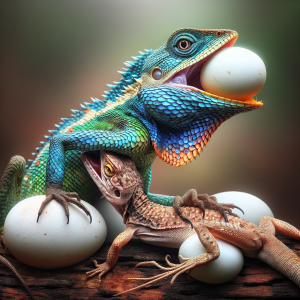Importance of Identifying Nutritional Deficiencies in Pet Lizards
Have you ever tried to solve a puzzle without all the pieces? That’s kind of what it feels like when you’re dealing with nutritional deficiencies in pet lizards. It can be a real challenge to figure out what’s missing from their diet and how to address it properly. But fear not, my friend, because we’re diving into this topic headfirst!
Imagine you’re all excited about your pet lizard, thinking you’re doing everything right, providing the best care possible. But then you start noticing some unusual behavior or physical symptoms that just don’t add up. That’s when the alarm bells start ringing, and you realize there might be a nutritional deficiency at play.
Identifying these deficiencies can be tricky because lizards are masters at hiding their weaknesses. They can’t just tell you they’re feeling a bit low on calcium or running short on vitamin D. No, you have to become a detective, observing their behavior, checking their physical appearance, and maybe even running some tests to get to the bottom of things.
But here’s where the challenge comes in: not all symptoms of nutritional deficiencies are straightforward. Some signs may overlap with other health issues, making it hard to pinpoint the exact cause. It’s like trying to solve a mystery with multiple suspects, each with their own alibi.
So, what’s a lizard owner to do in the face of this challenge? Stay vigilant, my friend. Keep a close eye on your scaly companion, monitor their diet closely, and be ready to seek professional help if needed. Remember, it’s better to address a potential deficiency early on rather than waiting for it to escalate into a bigger problem.
Nutritional deficiencies in pet lizards may present a challenge, but with patience, observation, and a bit of detective work, you can crack the case and ensure your reptilian friend stays happy and healthy for years to come.
Common Signs of Nutritional Deficiencies in Lizards
Let me tell you about the common signs of nutritional deficiencies in lizards. It’s really fascinating how these little reptiles communicate their needs to us through their behavior and appearance.
When I first got my pet lizard, I noticed that it was becoming more lethargic and its skin was looking dull. I did some research and discovered that these could be signs of a nutritional deficiency. That’s when I realized how important it is to pay attention to these subtle cues that our lizard friends are giving us.
Did you know that one common sign of nutritional deficiency in lizards is muscle weakness or twitching? It’s like their way of telling us that something is not quite right with their diet. By observing these signs, we can take proactive steps to address any deficiencies and ensure our lizards stay healthy and active.
Identifying these signs early on can make a big difference in the overall well-being of our pet lizards. It’s like being able to understand a whole new language that they are speaking to us through their behavior. By learning to recognize these signs, we can provide the proper care and nutrition that our scaly companions need to thrive.
So, next time you notice your lizard acting a little off or looking different than usual, take a closer look and see if it could be related to a possible nutritional deficiency. It’s all part of the fun and rewarding journey of being a responsible lizard owner!
Understanding the Nutritional Needs of Pet Lizards
Let me tell you about understanding the nutritional needs of pet lizards. This is crucial because just like us, lizards have specific dietary requirements to stay healthy and thrive.
When I first got my pet lizard, I didn’t realize how important it was to know exactly what they need to eat to stay healthy. I thought, “Hey, they’re reptiles, they probably eat bugs and that’s it, right?” But I soon learned that their nutritional needs are much more complex than that.
Did you know that different species of lizards have varying dietary needs? For example, herbivorous lizards like iguanas require a diet rich in leafy greens and vegetables, while insectivorous lizards like bearded dragons need a diet high in insects such as crickets and mealworms. Understanding these distinctions is essential to providing the right nutrition for your scaly friend.
One practical tip I learned along the way is to research the specific dietary requirements of your lizard species. This can involve consulting with a reptile veterinarian or doing thorough online research from reputable sources. By understanding your pet lizard’s nutritional needs, you can tailor their diet to ensure they are getting the essential nutrients they require for good health.
It’s fascinating to think about how different lizards have evolved to thrive on specific types of food. Have you ever wondered why some lizards are herbivores while others are carnivores? The diversity in their dietary preferences is not only interesting but also underscores the importance of providing the right nutrition for your pet lizard.
By taking the time to understand the nutritional needs of your pet lizard, you can ensure that they lead a healthy and happy life. So, whether you have a bearded dragon, a gecko, or an iguana, remember that a well-rounded and balanced diet is key to keeping your scaly companion in top shape.
How to Perform a Nutritional Assessment for Your Lizard
Let me share a personal anecdote related to performing a nutritional assessment for your pet lizard. When I first adopted my bearded dragon, I noticed he was becoming lethargic and not as active as usual. Concerned about his health, I decided to delve into understanding his nutritional needs better.
Performing a nutritional assessment for your lizard is crucial because it helps you identify any deficiencies that may be affecting their health. Just like us, lizards require a balanced diet to thrive and stay healthy. By assessing their current diet and observing their behavior and physical condition, you can gain valuable insights into whether they are getting the nutrients they need.
During my assessment, I carefully observed my bearded dragon’s eating habits, noting the types of insects and vegetables he consumed and how much water he drank. I also paid attention to any changes in his skin texture, color, or energy levels. This holistic approach allowed me to pinpoint areas where his diet may be lacking and make necessary adjustments.
Remember, every lizard is unique, and their nutritional requirements may vary based on factors like species, age, and activity level. By regularly performing a nutritional assessment for your pet lizard, you can ensure they are receiving a well-rounded diet tailored to their specific needs. This proactive approach not only promotes their overall health and well-being but also strengthens the bond between you and your scaly companion.
So, the next time you’re evaluating your pet lizard’s diet, take a moment to perform a thorough nutritional assessment. Your efforts will go a long way in keeping your reptile friend happy and healthy for years to come.
Addressing Calcium Deficiency in Pet Lizards
Did you know that calcium deficiency is one of the most common nutritional issues faced by pet lizards? It’s a crucial element in their diet, necessary for proper bone development and muscle function. Just like us, lizards need their daily dose of calcium to stay healthy and active.
I remember the time when I noticed my pet lizard, Spike, showing signs of calcium deficiency. He seemed lethargic and had trouble moving around his terrarium. After consulting with a reptile specialist, I learned that a lack of calcium in his diet was likely the culprit.
To address Spike’s calcium deficiency, I had to make some changes to his diet and supplementation routine. The vet recommended incorporating calcium-rich foods like dark, leafy greens and gut-loaded insects into his meals. Additionally, I started dusting his food with a calcium supplement to ensure he was getting enough of this essential mineral.
Ensuring that your pet lizard receives an adequate amount of calcium is crucial for their overall health and well-being. Without proper supplementation, lizards can develop metabolic bone disease, a serious condition that weakens their bones and can be life-threatening.
So, if you’re a proud lizard parent like me, make sure to pay close attention to your pet’s calcium intake. By providing a balanced diet and monitoring their nutritional needs, you can help prevent deficiencies and keep your scaly friend happy and healthy for years to come.
Vitamin Deficiencies in Pet Lizards and How to Correct Them
Let me tell you about vitamin deficiencies in pet lizards and how to correct them. It’s crucial to ensure your scaly friend is getting all the essential vitamins to stay healthy and happy.
Did you know that vitamin deficiencies are common in pet lizards, especially those not receiving a well-rounded diet? Just like humans, lizards need a variety of vitamins to support their overall health. Without these nutrients, they can develop serious health issues.
One practical tip to address vitamin deficiencies in pet lizards is to offer a diverse diet that includes a mix of vegetables, fruits, insects, and commercial lizard food. Each food item provides different vitamins, so variety is key to meeting their nutritional needs.
Now, let me share a personal anecdote about my experience with vitamin deficiencies in my pet lizard. A while back, my lizard started showing signs of lethargy and dull skin, which are common symptoms of vitamin deficiencies. After consulting with a reptile vet, I learned that my lizard was lacking vitamin A and D. By adjusting his diet and adding vitamin supplements as per the vet’s recommendation, my lizard gradually regained his energy and vibrant color.
It made me realize how crucial it is to pay attention to your lizard’s diet and ensure they are getting all the necessary vitamins. Sometimes, it’s easy to overlook these details, but they can make a significant difference in your pet’s well-being.
So, have you ever faced challenges with providing the right vitamins for your pet lizard? How did you address them? Share your thoughts and experiences in the comments below. Let’s keep our scaly friends healthy and thriving together!
Dietary Recommendations for Preventing Nutritional Deficiencies
So, when it comes to feeding your pet lizard, it’s not just about tossing a few bugs in their tank and calling it a day. No, no, my friend, these little reptiles have specific dietary needs that must be met to keep them healthy and happy. Picture this: your lizard, let’s call him Larry, is lounging on his favorite rock under the heat lamp, looking at you with those beady eyes, silently judging your choice of insect cuisine.
Now, when it comes to preventing nutritional deficiencies in Larry and his scaly friends, it’s all about offering a well-rounded diet. Think of it as a lizard buffet – not the kind with questionable meatballs, but one filled with nutritious options that cater to their needs. From leafy greens to gut-loaded insects, variety is key to ensuring they get all the essential nutrients they require.
But hey, we’re not all perfect lizard nutritionists from the get-go. It takes trial and error to figure out what works best for your scaled buddy. So, don’t be surprised if Larry turns his nose up at that kale salad you painstakingly prepared – lizards can be picky eaters too!
Remember, supplements can also play a crucial role in addressing any potential deficiencies. Just like how we pop a multivitamin when we’re feeling under the weather, lizards may benefit from a little boost now and then. But be sure to consult with a vet before adding anything new to their diet – you don’t want Larry going on a supplement spree without proper guidance!
So, the next time you’re whipping up a meal for Larry, think of it as your chance to be a lizard gourmet chef, creating a menu that’s both nutritious and delicious. Who knows, maybe your culinary skills will earn you a nod of approval from your scaly companion – or at least a contented lizard belly bask in the warmth of his terrarium.
Supplements for Pet Lizards: What You Need to Know
You know, when it comes to supplements for pet lizards, it’s crucial to be informed about what your scaly friend really needs. It’s like giving them a little boost to ensure they’re getting all the essential nutrients they might be missing out on from their regular diet. Think of it as their daily vitamin pill, but in a reptilian form!
One practical tip I can share is to always consult with a reptile veterinarian or an experienced exotic pet specialist before adding any supplements to your lizard’s diet. Not all lizards require the same supplements, and overdoing it can actually harm them rather than help. So, it’s essential to get tailored advice based on your specific lizard’s species, age, and health status.
Another crucial point to remember is to choose high-quality supplements specifically formulated for reptiles. Avoid using generic multivitamins or mineral supplements designed for humans, as they may contain ingredients that are harmful to your lizard. Look for reputable brands that cater to the unique nutritional requirements of pet lizards.
When it comes to administering the supplements, follow the recommended dosage instructions provided by the manufacturer or your vet. Some supplements may need to be dusted onto your lizard’s food, while others may come in liquid form for easier administration. Whichever method you choose, make sure your lizard is consuming the supplements consistently and that they are not being wasted or ignored.
Remember, a balanced and varied diet should always be the primary source of nutrition for your pet lizard. Supplements should only complement their diet and not replace it entirely. By being diligent and informed about the supplements you use, you can help ensure that your pet lizard stays healthy and happy for years to come.
Monitoring and Adjusting Your Lizard’s Diet for Optimal Nutrition
You know, when it comes to monitoring and adjusting your lizard’s diet for optimal nutrition, there’s a fascinating fact that might surprise you. Did you know that some lizards have specialized dietary needs based on their species? It’s not a one-size-fits-all situation. For instance, herbivorous lizards like iguanas require a diet rich in leafy greens and vegetables, while insectivorous lizards such as bearded dragons need a diet high in insects like crickets and mealworms.
Understanding these specific dietary requirements is essential for maintaining your pet lizard’s health. By tailoring their diet to meet their species’ needs, you can ensure they receive the proper balance of nutrients to thrive. It’s like a personalized meal plan for your scaly friend!
So, when you’re monitoring and adjusting your lizard’s diet, remember to consider their unique dietary preferences and requirements. By offering a varied diet that meets their nutritional needs, you can help your pet lizard lead a happy and healthy life. And who knows, maybe they’ll show their gratitude by lounging contentedly under their heat lamp or giving you a little lizard wave with their tiny claw. It’s all part of the joy of caring for these fascinating creatures!
Remember, every lizard is different, so take the time to learn about your pet’s specific dietary needs and make adjustments as needed. Your pet lizard will thank you for it with their vibrant colors, energetic behavior, and overall well-being. Happy feeding!
Tips for Maintaining a Healthy Diet for Your Pet Lizard
You know, when I first got my pet lizard, I had no idea about the importance of addressing nutritional deficiencies. It wasn’t until I noticed some concerning signs in my lizard that I realized I needed to take a closer look at its diet. That’s when I dove into learning more about how to ensure my scaly friend was getting all the nutrients it needed to thrive.
When it comes to monitoring and adjusting your lizard’s diet for optimal nutrition, it’s crucial to pay attention to their behavior and physical appearance. For instance, if you notice your lizard becoming lethargic, experiencing weight loss, or showing signs of weakened bones, these could be indications of a nutritional deficiency.
To address these issues, one practical tip is to consult with a reptile veterinarian or exotic animal specialist. They can provide valuable insights into your lizard’s specific dietary requirements and recommend appropriate supplements if needed. Additionally, keeping a detailed record of your lizard’s diet and any observed changes in behavior or health can help you track their nutritional status over time.
Remember, every lizard is unique, and their nutritional needs may vary based on factors like species, age, and overall health. By staying proactive and attentive to your pet’s well-being, you can ensure they receive the proper nutrients to lead a happy and healthy life.
So, if you want to guarantee your pet lizard is living its best life, don’t overlook the significance of identifying and addressing nutritional deficiencies. Your scaly companion will thank you for it with its energetic antics and vibrant appearance!




